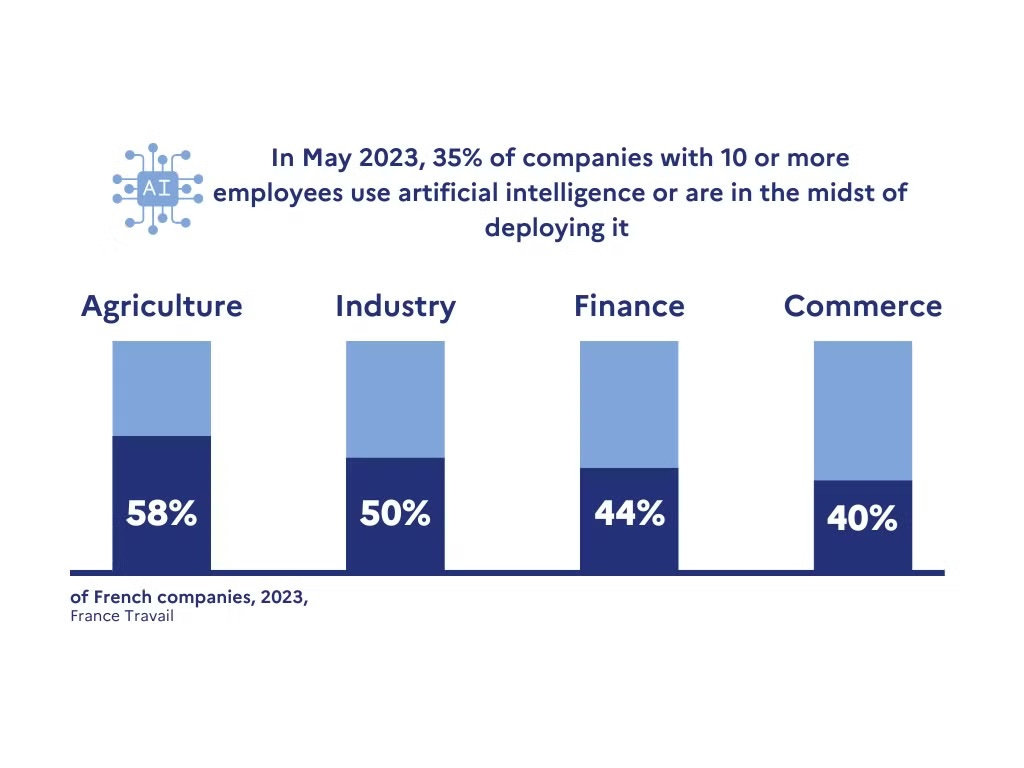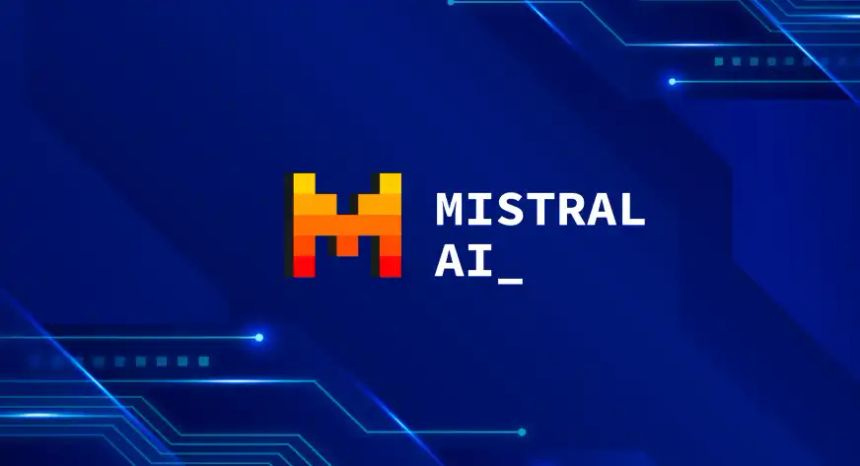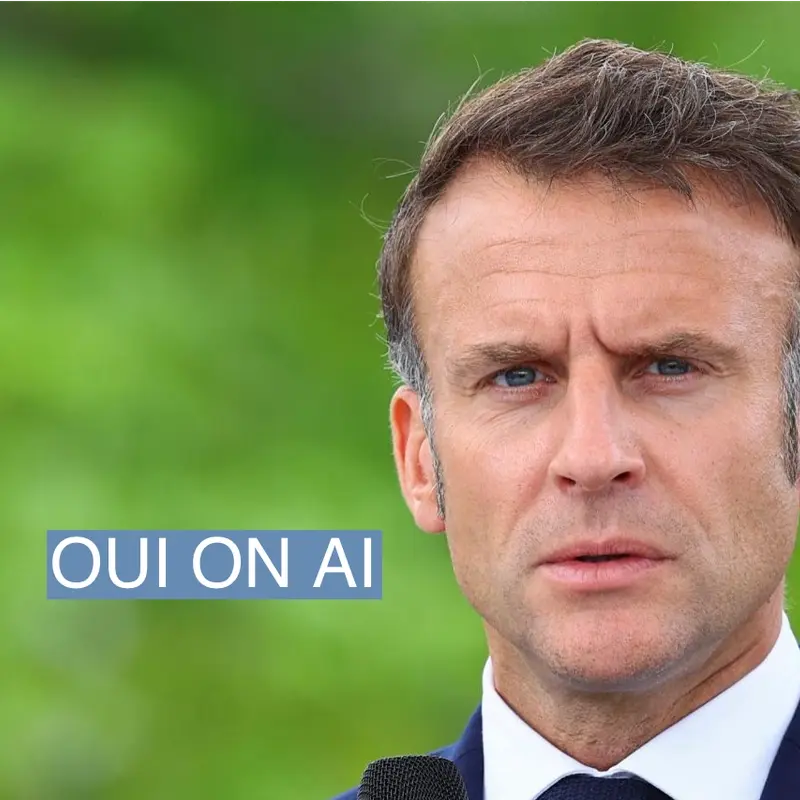FRANCE THE AI EURO CHANCE LibAIrté, ÉgAIlité, FratérnAIté OPPORTUNITÉ ----- €1 Trillion in Native Efficiency
On France's Time to Lead the EU and Europe with AI
[AUTHOR BACKGROUND: In addition to political science and law, my studies have included international relations and the history and operations of the EC and EU Rome Treaty subsidiary and shared legal competences and related. At the University of San Francisco 94-96, and also in law school at the University of San Francisco School of Law including IP and Comparative Civil Liberties, with a graduate legal paper on “EU Trademark Law” (need to find this and post, primitive as it may be) (00-02), and a summer study on same specifically at Trinity College, Dublin Ireland (2000). Have used this training and study to assist IP clients with international issues over the years.]
A RED BLUE & WHITE PAPER - THE CASE FOR FRENCH NATIONAL AI
Artificial intelligence (AI) continues to fundamentally reshape technology and global human reality.
Yet in Europe, languidity.
The EU has made perhaps what may be its final (?) miscalculation in estopping flow of liberal AI Development at a time when Europe needs it the most.
It would seem it would take a maverick, one with a sense of art to explain to the existential permiteers AI’s value as a storehouse of information, art, and civilization.
And if can not be explained, then simply to demand. Or better still, to show.
Britain is “cashing its Brexit chip,” and going in for AI. Great BritAIn.
France, a nation long recognized for its leadership in technological innovation, is even better positioned to capitalize on the opportunity,
because it is already a leader,
because it is the home of Mistral, as formidable a tool as ChatGPT Anthropic and yeeks, the feral DeepSeek,
and because of the structure of its government and history vis a vis application of EU superlaws.
Given the excessive official EU-AI entanglements, the path is for France to demonstrate to the world (and Europe besides) in a manner still in the legal competence of the nation-state, free of EU strictures
— under principles of subsidiarity and/or differentiated integration (principles of EU law and regulation) — surely in running its own affairs can France choose.
And it has a ready domestic legal mechanism already pre-existing.
USA has just launched its Department of Government Efficiency (DOGE)—to evaluate, cut, clean, and re-order government operations and budgets.
But where there is DOGE, France already has the MAP for freeing AI — Ministère de l'Action Publique.
Not only much older than DOGE, but even older than the EU!
1945!
In the law we call such a twist of history a “gimme.”
The department responsible for government efficiency is called the "Ministère de l'Action publique, de la fonction publique et de la simplification"
This translates to "Ministry of Public Action, Civil Service, and Simplification".
Key responsibilities of this ministry include:
Modernizing public action and the civil service
Coordinating initiatives to improve quality and efficiency of public services
Simplifying administrative procedures
Implementing the government's policy on civil service reform
Overseeing the "Services Publics +" program, which aims to make public services more accessible, simpler, and more effective
The Ministère de l'Action Publique works to enhance government efficiency through various initiatives and programs focused on streamlining processes, improving service delivery, and increasing transparency in public administration.
Did I mention 1945?
This twist of history and ‘quirk; of French law, in effect, Trumps (if you will pardon me) the effects of anti-AI EU illegalizations, based upon France’s pre-existing individual sovereign rights alone.
France can AI because it can. It has free hands.
And France should AI because it must — for the good of AI in France, for the survival and the inspiration of AI in Europe, and for Global AI development.
And it suggests as a regulatory recommendation best begin with government operations and go from there.
"Le cas d'utilisation est l'État"
[The Use Case is the State]
Not DOGE and Elon. France can go it eh-LONE, and should.
Leveraging the capabilities of its native son Mistral AI, France can significantly reduce government expenditures, targeting €1 Trillion in savings over the next decade.
These efficiencies will not only lower costs for taxpayers, enhance public services, and create a more agile and responsive government (OECD, 2023), but
A strategic and forward-thinking approach to AI-based state modernization that ensures greater efficiency, financial sustainability, and economic prosperity will in effect “build out” use of AI in the entire global technosphere.
Data touches data, borderless.
Sept-2024, Council of Europe signs the Framework Convention on Artificial Intelligence on behalf of European Union re the EU AI Act LINK (more notes at end)
In France, recent public concerns regarding rising taxes and budget constraints highlight the importance of leveraging AI as a tool for growth to address these, as the alternative to austerity.
By reducing waste and optimizing public administration through showcasing the power of AI, France will benefit both its own citizens and nation, but more — build the broader global AI economy of successful use cases, from French soil, with compounding returns.
The Good News is that the French are Early Adopters of AI
The Role of Mistral AI
“Independent, open, native, decentralized, unoligopolistic.”
That’s what pioneer Arthur Mensch said in 2023 in founding Mistral AI — specializing in deep learning, large-scale AI models, and natural language processing.
Mistral AI is the only player, and the only AI uniquely suited to drive the modernization of France’s public sector in this idea, delivering efficiency improvements across key government functions.
What can be Done? Key AI Contributions to Government Efficiency
AI-Powered Fraud Detection & Compliance Monitoring
AI-driven real-time fraud detection in tax collection, healthcare, and social benefits could save up to €200 billion annually (European Commission, 2023).
Predictive risk models can identify fraudulent transactions before disbursements, preventing financial abuse (OECD, 2023).
AI behavioral analytics can detect irregular financial patterns, improving compliance and reducing tax evasion (IMF, 2023).
AI-powered automation can streamline government operations, reducing administrative workloads by 40% (McKinsey, 2023).
Virtual assistants and chatbots can process citizen inquiries, tax filings, and social security applications, cutting response times by 60% (French Digital Economy Report, 2023).
AI-driven natural language processing (NLP) can accelerate policy formulation, reducing bureaucratic bottlenecks (Harvard AI & Governance Review, 2023).
AI-driven tax compliance algorithms can detect corporate tax loopholes and underreported income, recovering up to €80 billion annually (IMF, 2023).
Automated auditing systems ensure 100% compliance, reducing reliance on manual tax inspections (France’s Directorate General of Public Finances, 2023).
AI-powered dynamic taxation models can adjust tax structures in real-time, optimizing revenue collection without burdening taxpayers (World Bank, 2023).
AI-based urban planning can reduce long-term infrastructure costs by €90 billion, optimizing traffic flow, public transportation, and energy efficiency (European Investment Bank, 2023).
Predictive maintenance models can cut public infrastructure repair costs by 30%, preventing costly failures in roads, bridges, and rail networks (International Transport Forum, 2023).
AI-driven energy management systems can optimize electricity consumption, reducing government energy expenses (International Energy Agency, 2023).
€1 Trillion by the numbers, Projections
Healthcare optimization: AI-driven diagnostics and personalized treatment plans could reduce healthcare costs by €200 billion.
Smart energy management: AI systems optimizing energy distribution and consumption could save €150 billion in energy costs.
Automated administrative processes: AI-powered automation in government offices could cut administrative costs by €120 billion.
Predictive maintenance of infrastructure: AI-based systems predicting and preventing infrastructure failures could save €100 billion in repair costs.
Fraud detection and prevention: AI algorithms detecting tax fraud and social benefit misuse could recover €90 billion.
Traffic management and smart transportation: AI-optimized traffic systems could reduce congestion and fuel costs, saving €80 billion.
Education personalization: AI-tailored learning programs could improve educational outcomes and reduce remedial costs by €70 billion.
Agricultural optimization: AI-driven precision farming could increase yields and reduce resource waste, saving €60 billion.
Cybersecurity enhancement: AI-powered threat detection could prevent cyberattacks, potentially saving €70 billion in damages and recovery costs.
Waste management optimization: AI systems improving recycling and waste reduction could save €60 billion in waste management costs.
This is a brainstorm, but AI is a brain business.
By integrating Mistral AI’s solutions across government functions, France could achieve up to €1 trillion in government savings over 10 years, and
Enhance public service efficiency while reducing operational costs.
Lower the tax burden on citizens and businesses, promoting economic growth.
Render Mistral AI and France as leader of Europe, and more.
For workers and businesses, AI will redefine job roles rather than eliminate them, making strategic workforce redeployment essential to maintaining economic stability.
France must take a leadership role in AI “re-skilling” initiatives, ensuring that displaced workers transition into new, high-value professions, building new career categories.
[As I have said a million times on this blog, AI may take jobs, but it *can* give many many more jobs. The key is prioritizing reskilling, we must think anew about the use cases across all spectrums of work and determine the use case and then build the tool for it, and not the other way around.]
Displaced civil servants can be re-deployed as AI ethics officers, compliance auditors, and fraud detection specialists (European AI Strategy, 2023),
and/or AI operators, designers, and builders.
A National AI Workforce Academy, in partnership with Mistral AI, universities, and research institutions, could train public sector employees in AI, governance, cybersecurity, code, data arts, digital ethics, and more (McKinsey, 2023).
Leading AI experts, including Yann LeCun, François Chollet, and Arthur Mensch, can advise on AI transition strategies, ensuring inclusive and sustainable modernization.
AI Tax Relief
Annual government savings of €100 billion could allow for €50 billion in annual tax reductions (OECD, 2023).
A €50 billion tax reduction could save households up to €1,250 per year (France Tax Authority, 2023).
Income tax rates could decrease by 2-4%, increasing household disposable income (World Bank, 2023).
AI-driven efficiencies in energy procurement could lead to lower VAT on electricity and fuel, benefiting millions of households (International Energy Agency, 2023).
Long-Term Economic Growth
A more efficient and cost-effective government will foster foreign investment and innovation.
Lower corporate tax rates will stimulate business expansion and job creation.
A national imperative with a native, national, embedded powerhouse AI could make France to AI what Singapore is to the investment industry.
Conclusions about France as the Use Case for European AI and Beyond
Among the nation-states of Europe, France is uniquely positioned in history and technology and law to become one of the world’s leaders in AI by begining with its public sector.
This is because
a) Their national law has already long-before provided for it.
b) It represents a “work around” from tiresome EU overregulation.
c) It has a native/captive AI enterprise in Mistral AI.
d) The geopolitical winds are blowing for reform, and France is reform.
e) It would have an underserved European market to sell into, especially as EU regulations necessarily loosen over time.
e) AI is the missing puzzle piece to remedy losses, avert austerity, and instead fill the coffers for many years to come.
AI presents a transformational opportunity for public sector modernization, and France is in the leader’s position.
Through decisive steps and a strategic AI governance framework, Mistral AI’s technological expertise, and an inventive workforce re-skilling project, France can position itself as the global leader in AI-powered public administration,
and after cracking that nut, as is being done in the USA with DOGE, the Monde.
LibAIrté. ÉgAIlité. ProspérAIté, OPPORTUNITÉ
Coda
About the EC signing on behalf of the EU an enabling legislation on Sept 2024, it had the following priorities (all of which not inconsistent with what I posit above, and seemingly supportive)
The EU, represented by the Commission, and with the support of Member States, participated very actively in the negotiations of this Convention. The convention is consistent with the EU AI Act as well as with other European Union law and includes a number of key concepts of the AI Act such as:
a focus on human-centric AI, consistent with human rights, democracy, and rule of law
a risk-based approach
key principles for trustworthy AI (e.g. transparency, robustness, safety, data governance and protection) (-AIC Mistral has lead in development and most experience)
transparency for AI-generated content and in interactions with AI systems
strengthened documentation, accountability and remedies
support to safe innovation through regulatory sandboxes (-AIC The nation-state of France as one very big regulatory sandbox)
risk management obligations
documentation obligations
oversight mechanisms for supervision of AI activities








